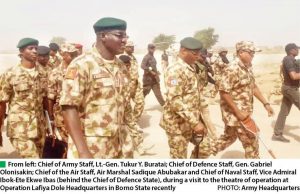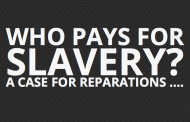It is the sort of nightmare Nigerians would have thought belongs only to those days gone by. But, by the time the president was said to have ordered the military to end the siege, it had been almost 12 hours of an instance when a national military put a newspaper house under its own rule book on national security. The military’s ground for going to ‘invite’ the journalists who wrote the story is because of “The disclosure of classified security information” which it says amounts to a breach of national security and runs contrary to Sections 1 and 2 of the Official Secrets Act. Defending the position, Brigadier-General Sani Usman who speaks for the Nigerian Army said the story that provoked it “afforded the Boko Haram terrorists prior notice of our plans and giving them early warning to prepare against the Nigerian military, thus sabotaging the planned operations and putting the lives of troops in imminent and clear danger “.

An Army Headquarters pix used in the Daily Trust story
Granted that it is not the practice to report war details but couldn’t a dialogic approach have worked better or was the siege intended to send a coded message to the society through the media? For many observers, the question is, assuming that the story the military says provoked it to shut down Media Trust compromised national security, has the dramatic siege on the newspaper house then helped national security?
The umbrella platform of Nigerian political parties – the Inter-Party Advisory Council, (IPAC), for instance does not think so. It has said in one of the earliest reactions that the siege a condemnable and anti-democratic move that should not have happened. The Nigeria Labour Congress, (NLC), is equally not persuaded because, as it argues: In these frighteningly difficult times, the military need more friends than self-made enemies”. That is what many would also think. So, why might the military have decided on a line of action that can alienate it at a time the nation is in a make or mar war with insurgents whose defeat is of concern to everyone?


























